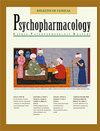5-HT1A和5-HT1B基因多态性与土耳其人群强迫症的关联
Q Medicine
Klinik Psikofarmakoloji Bulteni-bulletin of Clinical Psychopharmacology
Pub Date : 2016-11-08
DOI:10.5455/BCP.20151003063454
引用次数: 1
摘要
摘要目的:强迫症(Obsessive-compulsive disorder, OCD)是一种常见的神经精神障碍,遗传因素在其中起着重要的致病作用。我们研究了5-HTR1A (-1019 C/G)启动子区多态性和5-HTR1B基因G861C编码区多态性在土耳其人群中对强迫症易感性的作用。方法:采用PCR-RFLP方法,对76例强迫症患者和57例健康对照进行5-HTR1A (rs6296)和5-HTR1B (rs6295)两个单核苷酸多态性基因分型。结果:强迫症患者与对照组rs6296和rs6295基因型分布无明显差异。结论:据我们所知,我们的研究是第一个在土耳其人群中建立遗传变异5-HTR1A (rs6296)和5-HTR1B (rs6295)与强迫症的关联。根据我们的研究结果,5-HTR1A (rs6296)和5-HTR1B (rs6295)的多态性与强迫症之间的关系似乎并不明显。本文章由计算机程序翻译,如有差异,请以英文原文为准。
Association of 5-HT1A and 5-HT1B Gene Polymorphisms with Obsessive-Compulsive Disorder in a Turkish Population
ABSTRACTObjective: Obsessive-compulsive disorder (OCD) is a frequent neuropsychiatric disorder, in which genetic factors play important causative roles. We investigated the roles of the (-1019 C/G) promoter region polymorphism of 5-HTR1A and the G861C coding region polymorphism of 5-HTR1B genes in susceptibility to OCD in a Turkish population.Methods: Two single nucleotide polymorphisms, 5-HTR1A (rs6296) and 5-HTR1B (rs6295) genes were genotyped in 76 OCD patients and 57 healthy controls that were unrelated, using PCR-RFLP method.Results: We did not observe any difference in the genotype distributions of rs6296 and rs6295 between the OCD patient and control groups.Conclusions: As far as we know, our study is the first to establish the association of genetic variants 5-HTR1A (rs6296) and 5-HTR1B (rs6295) with OCD in a Turkish population. Based on our results, the relationship between polymorphisms of 5-HTR1A (rs6296) and 5-HTR1B (rs6295) with OCD do not seem.
求助全文
通过发布文献求助,成功后即可免费获取论文全文。
去求助
来源期刊
CiteScore
0.34
自引率
0.00%
发文量
0
审稿时长
6-12 weeks

 求助内容:
求助内容: 应助结果提醒方式:
应助结果提醒方式:


